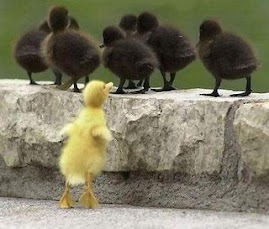So the Joe Wilson frenzy seems to be the media story du jour, giving the Dems something to talk about and the rabid right a new champion. I read a story headline today indicating that calling Obama a socialist or liar was the new vernacular for uppity (thanks to Ian). You can't get away with calling Obama a derisive term related to his race (which is mixed, but that's another issue), but you can call him a liar, a socialist, an ultra-liberal, ad nauseum. The South Carolina reaction mirrored the far right - Joe Wilson is a hero! He spoke truth to power! He put that Obama in his place! Are you getting the picture now?
Newsweek put out an article this week on how children interpret race and how discrimination comes into their psyche. It is a very good read (thanks to Airick). One of the upshots of the article is that kids will make distinctions and if adults sweep racial differences under the rug, we may be making things worse as we leave kids to their own devices. The point made is that adults who try to ignore race, mainly because they think acknowledging race is a de facto discrimination, are making things worse. Better to talk to kids about cultural differences, the fact that people are of different races, and the fact that none of that matters.
We hail Obama as the first African-American President, but we lash out at people who denigrate him because of his race. We can't be colorblind because racial difference is already out there. To ignore it is to confuse kids and leave people to their own interpretations. However, if we suggest that race doesn't matter we run the risk of being callous towards the history of discrimination and vestiges of the most egregious behaviors. These are examples of the confusion that many white people face (see the Newsweek article for the indepth discussion). To this I say, boo - frickin- hoo! Why are white people always whining about confusion with racism? Things like - we don't know what to say, or, black people are so sensitive, or, what am I supposed to do? Watch this video and see a great racism "experiment" in an upscale store and see what I mean (thanks to MILO). At least a few people stood up...
The recent court ruling that vindicated white firefighters who had been passed over for promotion in favor of minorities opened up the entire issue of racial preferences all over again. They claimed that we can't subsidize racial minorities without penalizing whites. Whites in this case declared that at some point the subsidy must stop and the penalizing end. Merit is a fine measure of who should get what job, which promotion, what opportunity. But if the playing field is inherently biased, then should those who are in deficit get better odds to level the playing field? To suggest that whites are penalized is to ignore the imbalance of the starting line. At the end of the day it seems that discrimination begets discrimination - if one group behaves as racists, we attempt to right the wrong. This leads to whites feeling slighted and claiming that minorities are getting more than they deserve if we are "colorblind."
I am sometimes criticized as being an apologist for my race. I don't apologize for my race, I admonish white people to get their act together and live responsibly in a diverse world.
Subscribe to:
Post Comments (Atom)









1 comment:
I've tried to figure out how to explain race to my son for five years now. His preschool teacher told me that you can tell whose parents have "racial issues" because most kids will comment on color differences - her skin is brown, his skin is pink - but the children who refer to each other as "black" or "oriental" or, god forbid, "colored" are the ones who hear about racial issues at home.
I've always wondered if it's better to talk about it, or ignore it and see what direction it goes. You said, "We can't be colorblind because racial difference is already out there," and that's an awesome argument for talking it out. They're going to face it at some point, and if they have a good basis they'll know how to deal with it.
Now I'm off to watch the video and read the article. :)
Post a Comment